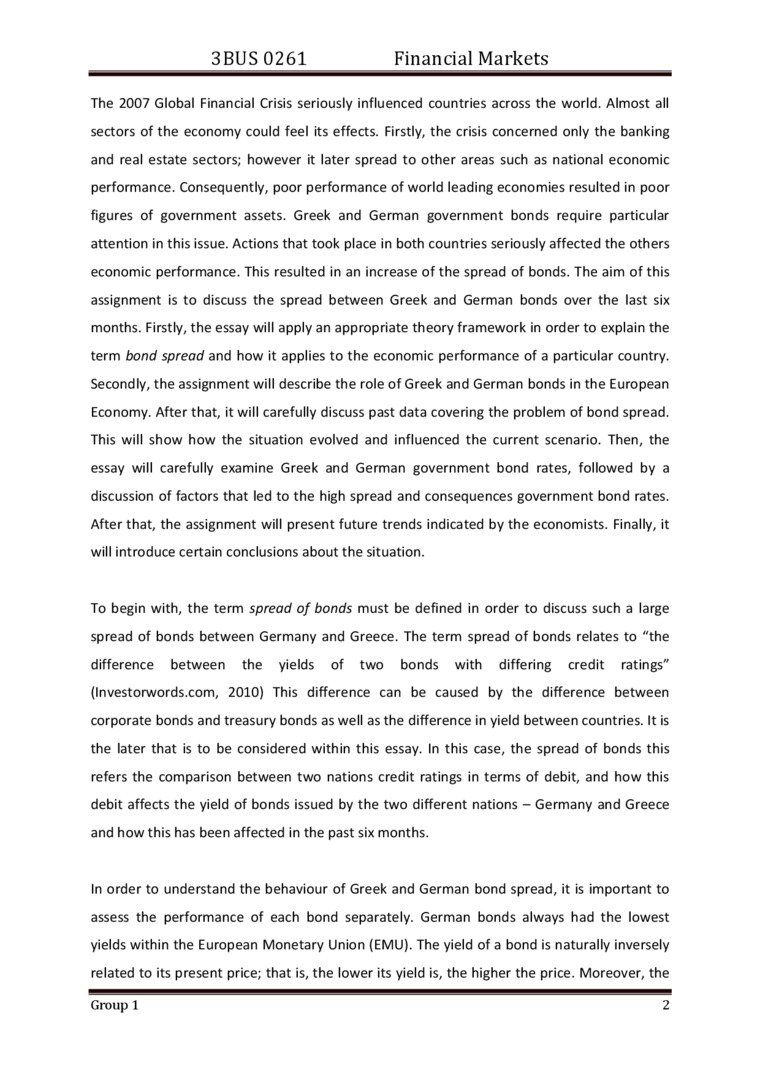12986

3BUS0261
Financial Markets
The 2007 Global Financial Crisis seriously influenced countries across the world. Almost all sectors of the economy could feel its effects. Firstly, the crisis concerned only the banking and real estate sectors; however it later spread to other areas such as national economic performance. Consequently, poor performance of world leading economies resulted in poor figures of government assets. Greek and German government bonds require particular attention in this issue. Actions that took place in both countries seriously affected the others economic performance. This resulted in an increase of the spread of bonds. The aim of this assignment is to discuss the spread between Greek and German bonds over the last six months. Firstly, the essay will apply an appropriate theory framework in order to explain the term bond spread and how it applies to the economic performance of a particular country. Secondly, the assignment will describe the role of Greek and German bonds in the European Economy. After that, it will carefully discuss past data covering the problem of bond spread. This will show how the situation evolved and influenced the current scenario. Then, the essay will carefully examine Greek and German government bond rates, followed by a discussion of factors that led to the high spread and consequences government bond rates. After that, the assignment will present futurę trends indicated by the economists. Finally, it will introduce certain conclusions about the situation.
To begin with, the term spread of bonds must be defined in order to discuss such a large spread of bonds between Germany and Greece. The term spread of bonds relates to "the difference between the yields of two bonds with differing credit ratings" (lnvestorwords.com, 2010) This difference can be caused by the difference between corporate bonds and treasury bonds as well as the difference in yield between countries. It is the later that is to be considered within this essay. In this case, the spread of bonds this refers the comparison between two nations credit ratings in terms of debit, and how this debit affects the yield of bonds issued by the two different nations - Germany and Greece and how this has been affected in the past six months.
In order to understand the behaviour of Greek and German bond spread, it is important to assess the performance of each bond separately. German bonds always had the lowest yields within the European Monetary Union (EMU). The yield of a bond is naturally inversely related to its present price; that is, the lower its yield is, the higher the price. Moreover, the
Group 1 2
Wyszukiwarka
Podobne podstrony:
6. Financial standing of the Daimler AG in the Period of the Global Financial
emerging markets lata 90, globalny kryzys finansowy 2007-2008) 1. Rynek funduszy pożyczkowych (kredy
22. C.64485 CENTRAL bank co-operation and intemational liąuidity in the financial
71450 slajd12 (96) QC6. Thinking about reform global financial markets, please tell me whether you a
11. BETWEEN debt and the devil : money, credit, and fixing global finance / Adair Turner. -Princeton
13 Re-shaping the Global Financial Architecture: Dual SIFIs Role for suitable measurement methods o
15 Re-shaping the Global Financial Architecture: Dual SIFIs Role failure could have economically si
17 Re-shaping the Global Financial Architecture: Dual SIFIs Role sition from Basel II to Basel III.
19 Re-shaping the Global Financial Architecture: Dual SIFIs Role Thomson J.B.: On Systemically Impo
FINANCIAL CRISISANDINSTITUTIONS Włodzimierz Szpringer INSTITUTIONALIZATION OF THE POLICY FOR
64. B.107643 INSTITUTIONS and development after the financial crisis / ed. by Sebastiano Fadda and P
Currency, Banking And International Finance - How Does Central And Eastem Europę Cope Up With The Gl
97. B.104188 GLOBALIZATION from below : the world s other economy / ed. by Gordon
for success Rock offers excellent conditions for entrepreneurs to service the Polish market, th
64. B.113208 FINANCIALISATION and financial crisis in South-Eastem European countr
2018 ITUC GLOBAL RIGHTS INDEX #Ten worst countries in the world for working people
GLOBAL RELEASES OF PRIMARY MICROPLASTICS TO THE WORLD OCEANSBY SOURCE (IN %). SYNTHETIC TYRES TEXTIL
więcej podobnych podstron